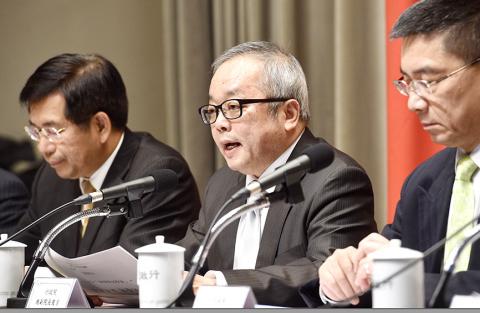The Executive Yuan yesterday proposed eight policies, dubbed the “Strengthen Taiwan Policies,” to counter the effects of 31 incentives for Taiwanese unveiled by China’s Taiwan Affairs Office.
The eight policies aim to increase benefits for researchers; lend more momentum to innovative industries; boost employee rewards and benefits; improve the work environment of medical professionals; enhance protection against corporate espionage; ramp up industrial innovation and transformation; boost the momentum of Taiwanese stocks; and deepen investment in the development of the film industry, Vice Premier Shih Jun-ji (施俊吉) told a news conference at the Executive Yuan.
The policies are to be geared toward four main goals: encouraging quality education and corporate jobs while intensifying efforts to keep talented individuals, as well as recruiting from abroad; maintaining Taiwan’s advantage in the global supply chain; promoting the expansion of the capital market; and strengthening the cultural and film industries, he said.

Photo: Peter Lo, Taipei Times.
Taiwan will become a top nation that will be attractive to talented individuals worldwide, will have a healthy economy and become strong, all based on liberty, democracy and the rule of law, he added.
China’s policies are aimed at siphoning off Taiwan’s capital and locally educated talent, which shows an evident political motive, Shih said, adding that the government must handle this issue practically and seriously.
“With a strong Taiwan, we will fear no challenge,” Shih said.
At least 15 items of the eight policies are to be implemented by the Cabinet and its various agencies this year.
To improve local stocks’ global visibility, the Cabinet said it would increase reviews for initial public offerings and cut down the review time from eight weeks to six.
Overseas subsidiaries of listed local companies would be encouraged to base themselves and list in Taiwan, the Cabinet said, adding that it would also promote the inclusion of 30 companies in an MSCI index to attract more international investment.
Measures to prevent corporate secrets from being leaked to China would include amendments to the Trade Secrets Act (營業秘密法) to establish a “retention of corporate secrets” system and punishments for related criminal activity for breaking such laws, it added.
To accelerate industrial innovation and transformation, the Cabinet said it would subsidize corporations’ purchases of “smart” machinery and software that would help them maintain a competitive edge.
It added that it would provide assistance to facilitate strategic alliances between Taiwanese industries and international corporations to further bolster the nation’s edge in the global supply chain.
Separately yesterday, Premier William Lai (賴清德) said the Cabinet would refer to China’s new policies — which Beijing has termed “incentives for Taiwan” — as simply “measures” to avoid playing along with China’s rhetoric.
As long as Taiwanese can demonstrate solidarity and bolster the nation’s economy on the foundation they have built, the nation will attract more talent and increase its global presence, Lai said.
Additional reporting by Sean Lin and Chen Mei-ying

CHAOS: Iranians took to the streets playing celebratory music after reports of Khamenei’s death on Saturday, while mourners also gathered in Tehran yesterday Iranian Supreme Leader Ayatollah Ali Khamenei was killed in a major attack on Iran launched by Israel and the US, throwing the future of the Islamic republic into doubt and raising the risk of regional instability. Iranian state television and the state-run IRNA news agency announced the 86-year-old’s death early yesterday. US President Donald Trump said it gave Iranians their “greatest chance” to “take back” their country. The announcements came after a joint US and Israeli aerial bombardment that targeted Iranian military and governmental sites. Trump said the “heavy and pinpoint bombing” would continue through the week or as long

TRUST: The KMT said it respected the US’ timing and considerations, and hoped it would continue to honor its commitments to helping Taiwan bolster its defenses and deterrence US President Donald Trump is delaying a multibillion-dollar arms sale to Taiwan to ensure his visit to Beijing is successful, a New York Times report said. The weapons sales package has stalled in the US Department of State, the report said, citing US officials it did not identify. The White House has told agencies not to push forward ahead of Trump’s meeting with Chinese President Xi Jinping (習近平), it said. The two last month held a phone call to discuss trade and geopolitical flashpoints ahead of the summit. Xi raised the Taiwan issue and urged the US to handle arms sales to

BIG SPENDERS: Foreign investors bought the most Taiwan equities since 2005, signaling confidence that an AI boom would continue to benefit chipmakers Taiwan Semiconductor Manufacturing Co’s (TSMC, 台積電) market capitalization swelled to US$2 trillion for the first time following a 4.25 percent rally in its American depositary receipts (ADR) overnight, putting the world’s biggest contract chipmaker sixth on the list of the world’s biggest companies by market capitalization, just behind Amazon.com Inc. The site CompaniesMarketcap.com ranked TSMC ahead of Saudi Aramco and Meta Platforms Inc. The Taiwanese company’s ADRs on Tuesday surged to US$385.75 on the New York Stock Exchange, as strong demand for artificial intelligence (AI) applications led to chip supply constraints and boost revenue growth to record-breaking levels. Each TSMC ADR represents

State-run CPC Corp, Taiwan (CPC, 台灣中油) yesterday said that it had confirmed on Saturday night with its liquefied natural gas (LNG) and crude oil suppliers that shipments are proceeding as scheduled and that domestic supplies remain unaffected. The CPC yesterday announced the gasoline and diesel prices will rise by NT$0.2 and NT$0.4 per liter, respectively, starting Monday, citing Middle East tensions and blizzards in the eastern United States. CPC also iterated it has been reducing the proportion of crude oil imports from the Middle East and diversifying its supply sources in the past few years in response to geopolitical risks, expanding